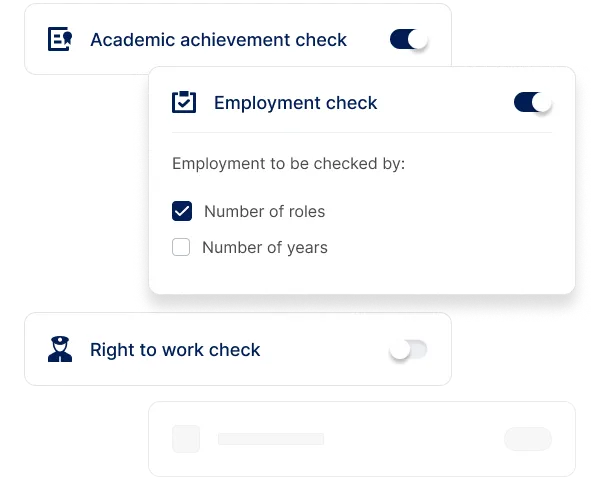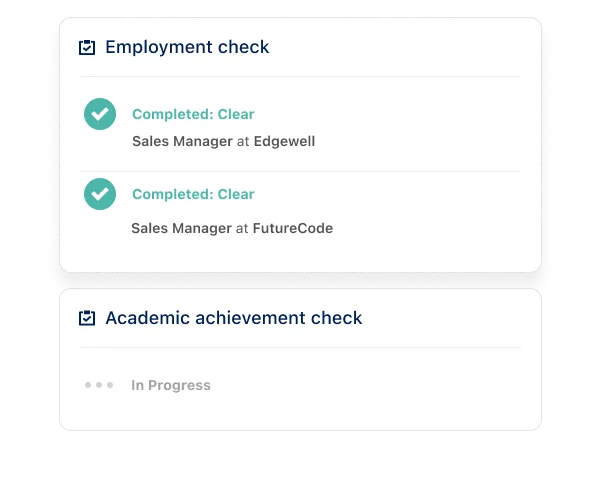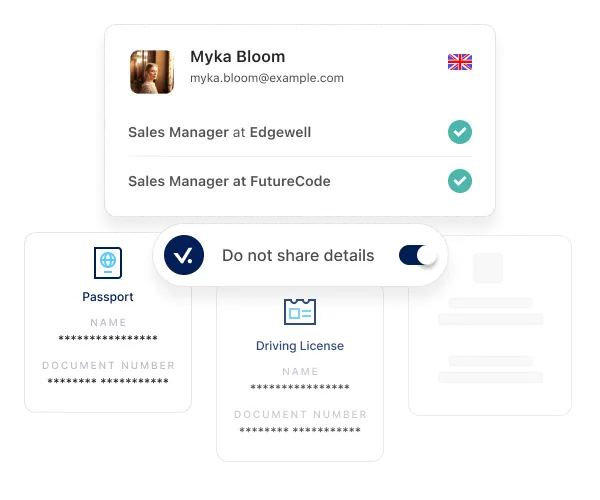We will review a candidate’s CV, identifying any periods that are professionally unaccounted for. We will then collect an explanation from the candidate and share the results with your team to ensure consistency with what was disclosed during the interview process.

CV gap checks - get the full picture
Gaps within a CV can happen for all kinds of reasons. A break can be down to travel, ill health, or other personal circumstances. Sometimes, there can be other reasons which may affect your hiring decisions.
This option enables us to look into any gaps recorded as part of a CV check. Whether it’s a recent job loss, or something else, our findings will identify any unexplained periods.
Our CV gap check includes:
- Recent job loss
- Unemployment in between jobs
Trusted by the world's best workplaces






PROVEN
.png)
.png)




and Loved by reviewers
Easy
Reduce risk
No lock-in
Global checks
24/7 support
Faster time to hire
With our award-winning software, we’re the number one choice for leading brands and workplaces all over the world.
While previous employers can shine a light on your candidate, it’s the unexplained gaps between roles that can raise the bigger questions. We look into gaps that are professionally unaccounted for.
As part of our CV gap verification, we can bundle them in with reference checks and together they're known as Background Verification.
How it works



Related checks
FAQs
The most common form of gap reference is to obtain written confirmation from a professional referee or a character referee who knew the candidate during the gap period in question. This person is known as a gap referee.
Some employers will require resumes with no gaps between jobs and others only require one or two years without gaps. It's also important to note that some companies will only accept applicants who have been working in the field for a certain amount of time. A good rule of thumb is that a candidate should have no more than a year's worth of work experience between his most recent and previous jobs.
A candidate’s employment gap is an important factor to be considered when hiring. It can make or break that individual’s candidacy. In today’s competitive job market, employers have to be more careful about the candidates they hire. It is not just about skills and experience anymore. Employers now also want to know what a candidate has done in the past few years and how that experience will help them in their new role. Employees with gaps in their resume may often be passed-over for those without gaps, because employers may assume that there must be something wrong with their past employment if they could not find work for a long time period of time. This is not always the case, though, as some people may have been pursuing other passions or were taking care of children or other family members at home while trying to look for work.
The first thing to do is to find out the reason for the employment gap. If it's maternity leave or a sabbatical, then it shouldn't be an issue. However, if a candidate was unemployed for a year and did not explain the reason for your unemployment, then that can be an issue.
Resume gaps are often a source of worry for both the employer and the applicant. However, it is important to evaluate these gaps in order to determine whether or not they are relevant to the job. The first step in evaluating the gap is to determine whether or not it was voluntary. If it was, then you may want to look into why this person decided to leave their previous position. If it was involuntary, then you can use that as an opportunity for empathy and understanding towards your applicant. The second step is determining how long ago this gap occurred. If it has been more than a year, then most likely there is no need for concern because people may have had many reasons for leaving their previous job and they may have found something better suited to them more recently.
One common warning sign of lying on a background check is inconsistency. Your potential job candidate might not tell the truth about their education, previous work experience, or what they did at certain positions.
There are a number of reasons for gaps in a CV. One reason is that a career path has been interrupted by a career change or illness. Another reason is that a candidate had to take time off work to care for children or family members. Another reason is being unable to find work in the field or country and having to relocate.
A CV / resume gap is an employment gap that a job seeker leaves on their resume that they do not explain. It is a red flag for hiring managers and should be addressed in the interview process. Hiring managers should look for these gaps in order to assess whether the candidate will be able to prosper in the position or not. For example, if a person has been out of work for six months, it could indicate that they are not ready to jump into a new role yet. A resume gap can also indicate that the job seeker has had an unsuccessful career and this might affect their chances of getting hired. Some other reasons why someone might have gaps on their resume are: lack of experience, taking time off to raise children, health issues or military service.
Gap analysis is the process of checking the dates on a candidate's resume are up-to-date and accurate.
When there is a gap on candidate work history, an employer may think that there were some serious issues going on during this time. In order to get a better understanding of what transpired during this timeframe, it's important to conduct a gap analysis. This will give an employer more insight into the reasons behind the gaps and help you make an informed decision about future opportunities.
Verifying gaps in cv is a very important process to ensure that the candidate is honest with their statement of their skills. This should be done before completing a recruitment process to avoid a miss-hire. Gaps in CV can lead to a number of problems for both the company and the candidate.
Transform your hiring process
Request a discovery session with one of our background screening experts today.






